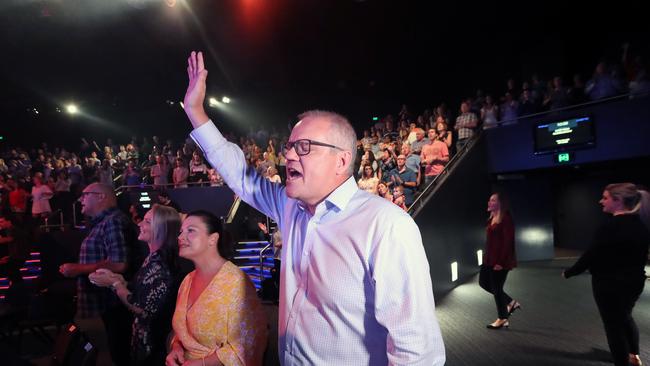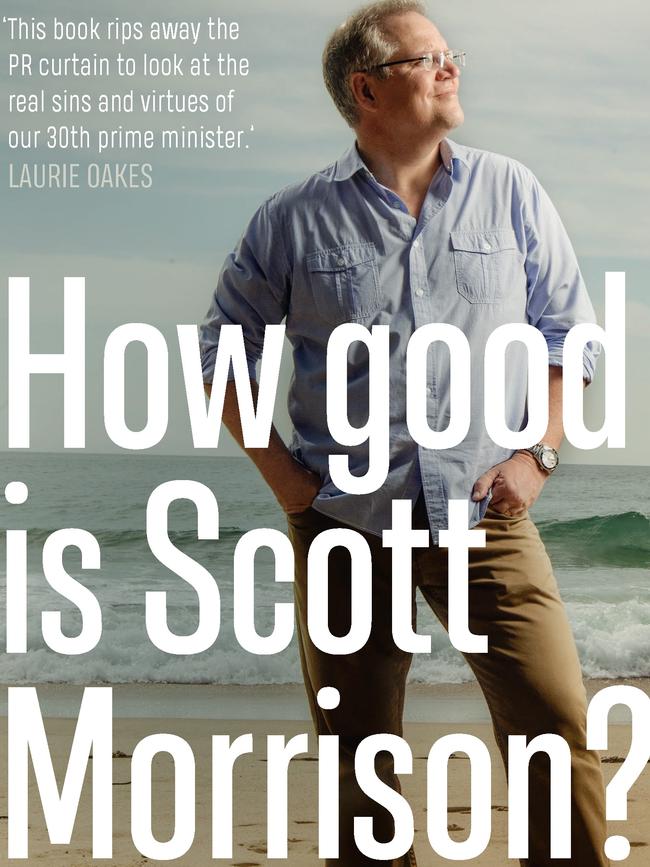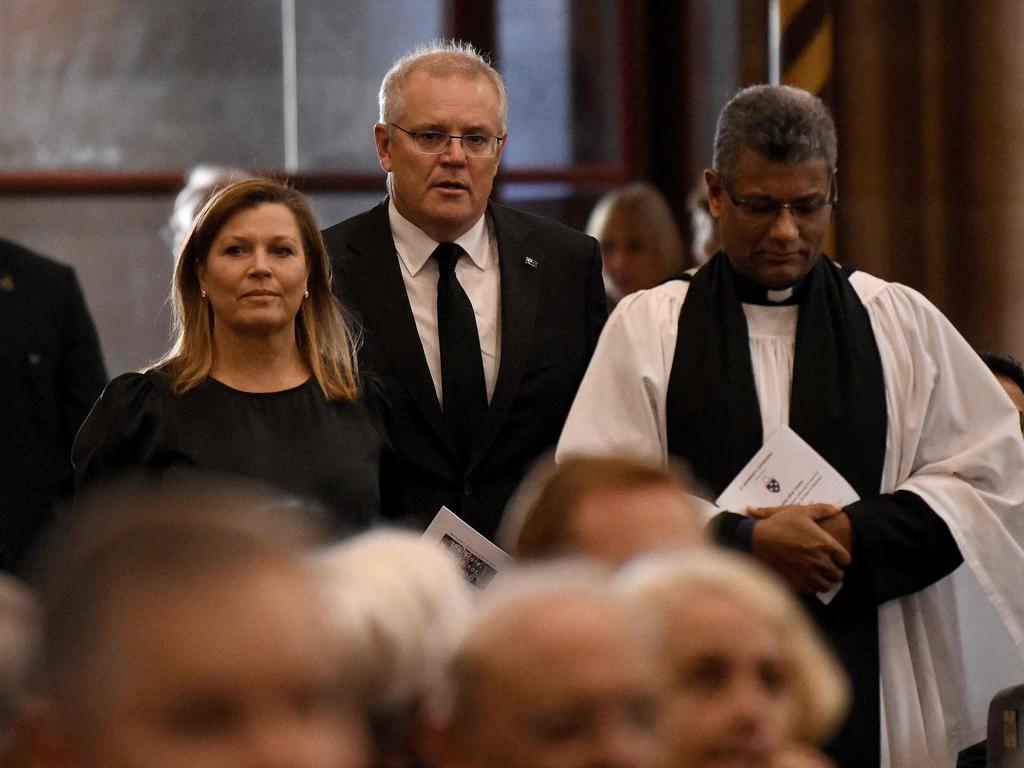Scott Morrison masters the sleight of hand of faith
Perhaps it is the smugness of knowing that you will be saved while others burn in hell, but the miracle man of modern Australian politics brandishes his own flexible version of religion.

For the most part, Scott Morrison prefers to keep matters of faith private. When he became Prime Minister this led to fevered imaginings on the part of many observers of Scotty from Marketing speaking in tongues as he awaited the rapture. In turn, the cartoonish characterisation of his faith confirmed in Morrison’s mind his instinct to separate church and state in his life. The Morrisons also separate their faith from their television viewing habits. Diehard Game of Thrones fans Scott and Jenny didn’t miss an episode of the gruesome and sexually charged eight-season fantasy television series.
Morrison speaks about his faith in very general terms. Pentecostalism sheds some light — although not much — on his attitude to economic and social issues. He points out that the Bible is not a policy document. We’re naturally curious about the details of his baptism, which the family keeps to itself. The circumstances surrounding an adult raised in a Presbyterian family joining the Pentecostals is itself interesting. Studies show it is marginalised folk of one kind or another who make that transition. What was going on in Morrison’s life at the time and how does he perceive that transition? He certainly saw the arrival of his and Jenny’s children as a miracle, after years of unsuccessfully trying. Morrison’s first parliamentary speech was heavily focused on that moment and what it meant to him and Jenny, and their faith. But that was evidence of the faith, not what drew Morrison to it. He had already been converted.
Scott Morrison’s faith does bring a pointed approach to an especially modern piece of right-wing rhetoric. In firmly middle-class Sutherland Shire, where he moved to contest a seat, the idea your wealth is deserved and blessed by God naturally goes down well. Yet the comparatively brief history of the Pentecostal church shows the malleability of doctrine in service of social standing. To some, Pentecostalism is a liberating force, to the more privileged it provides assurance that God has backed them in. What often drives belief under those circumstances are political and social alignments outside the church.
Each Pentecostal church fills quite different sociological niches. The core of the faith, which marks it out from mainline Protestantism, is acceptance into the church of all who claim a direct experience of God. At the founding of Pentecostalism in the early 20th-century US, this had a democratising effect — allowing the new religion to cross race and class lines, and to soon spread in Africa and Asia.

Religion is divided in the same ways society is divided. As someone who was welcomed from outside the Pentecostal church, Morrison might emphasise the egalitarian nature of that experience. Sociologically, though, he was a prime candidate for a more individualistic message. This is reinforced by the smugness of knowing that you will be saved while others burn in hell. In turn, though, Morrison’s faith has buttressed contemporary Coalition rhetoric about economic inequality and equal opportunity. He chose to address these issues in his first major speech as Prime Minister in 2018. “Every Australian matters,” he said, adding people’s capacity to “have a go” didn’t relate to their level of ability, citing young disabled people he met at not-for-profit Youngcare in Brisbane who he said were an “inspiration”. “They wanted to live on their own,” he enthused. “They wanted to be in their own accommodation, living together, having the same choices as other young Australians. They’re having a go and they’re getting a go.” A shot across the bows, then, of disabled people not having a go, and an unhelpful approach to complex policy questions such as disability insurance. “That’s why we have a safety net in this country — to protect people — but it works as a trampoline, not as a snare.”
It was resonant of Joe Hockey’s “lifters and leaners” rhetoric from 2014 — the kind of comment that is often just boilerplate, unrelated to how these politicians react to a given set of human circumstances. In the case of Hockey, these words came from a speechwriter. From Morrison, it’s straight from the soul. “The best form of welfare is a job, and our safety net, our social safety net, enables people either to bounce back up … on their feet, or it provides them with that place of comfort and support that they need during challenging times in their lives,” he said in the same speech. “As Australians, we look after our mates.” Again, the qualification: “mates”, not citizens. Eventually, during the bushfires, Morrison demonstrated this unwillingness to empathise with his fellow Australians, to his great political cost.
Other tenets of Pentecostalism are equally open to interpretation. Just as Methodism’s prohibition on dancing didn’t seem to influence John Howard, we might give Morrison enough credit to let the speaking in tongues go through to the keeper. An individualistic approach to social justice overlaps with attitudes to the environment. Christianity more generally supports the idea of God giving us stewardship of the environment. For Pentecostals, any interpretation of this stewardship which may limit an individual’s potential to rise above their circumstances will be discounted. Pentecostals are the religious group in Australia, and other parts of the world, least likely to accept the science of climate change. This helps explain why Morrison has been a more consistent climate sceptic than the Catholic Tony Abbott, who was in favour of a carbon tax before he was against it.

The way climate change is perceived also matters. Responses to climate change come in many varieties. While environmentalists wish we had simply left nature to its own devices, and seek solutions consistent with that principle, a mastery of technology may also provide solutions. The latter is more consistent with Christian approaches which emphasise stewardship.
There’s another explanation for Morrison’s attitude to climate change: it’s a view shared by a majority of Liberal Party members. Morrison is a conformist. In that conformism lies a path to a different approach as public opinion shifts towards more action to reduce emissions. Only 1 per cent of Australians follow Pentecostalism. It is the mega-churches that made them targets for political leaders like Bob Carr and Peter Costello. Given its theological content, it’s not surprising that one of these churches found fertile ground in lilywhite Sutherland Shire. In the early 21st century, Morrison is hardly on his own as a reactionary, insular, middle-aged man. Why blame religion for that?
Reinforcing the conspiratorial edge in public discussion about his religion is the minority status of Pentecostalism in Australian society. Despite its rapid rise over the 20th century, Morrison is the first Pentecostal in the world to become a national head of government. There is plenty of theological diversity within Pentecostalism. Indeed, the brand most common here — most famous for the so-called prosperity gospel — is sometimes labelled neo-Pentecostalism. The various versions of prosperity gospel in evangelical sects would not have surprised Karl Marx given his observations about religion serving economic forces, not the other way around.
So, too, Morrison found plenty to like in Liberal Party mythology. Paying homage to Menzies, as all Liberal leaders must, he said: “It’s all about the individual, and the capacity and the value and the sanctity.” The marketing version of the Liberal Party gospel. “No party seizes the imagination of the people unless the people know the party stands for certain things,” he continued, “and we’ll fight for those things until the bell rings.” Ready to fight. Just point him in the right direction. Conservative leaders don’t foreshadow a great program of reform. They adapt to changing circumstances. Australia’s circumstances would indeed change. Having made it to the party leadership in 2018, Morrison, though, looked like what he was: a prime minister in search of a purpose.
This is an edited extract from How Good is Scott Morrison? by Wayne Errington and Peter van Onselen, published by Hachette Australia. Out now.






To join the conversation, please log in. Don't have an account? Register
Join the conversation, you are commenting as Logout